Grammar 01
牛津译林英语 九年级上册 Unit1 Grammar (共39张PPT)
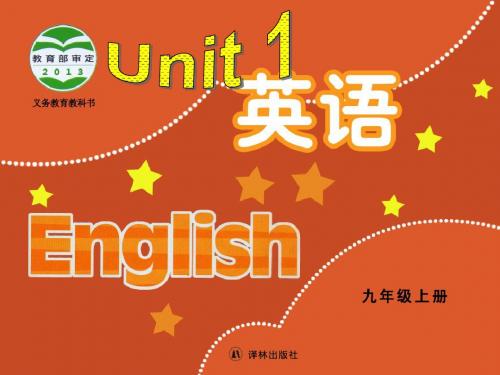
1. I dislike not only coffee but also Cola.
2. I like neither maths nor English. 3. You either take the lead or fall
behind. 4. Both Sandy and Millie have been to
neither…nor… “既不……也不……”, 具有否定含义。当neither…or…连接两 个主语时,其谓语动词应与最近的一个 主语在人称和数上保持一致。
e.g. Billy has not finished his homework. Daniel has not finished his homework. Neither Billy nor Daniel has finished his homework.
Amy’s family and classmates Amy is writing about what her family does at the weekend. Help her complete the sentences with the correct conjunctions.
1. __N_e_i_th__e_r_ my dad __n_o_r__ my mum
We use conjunctions like and, but, or and so to join ideas together.
M1 Unit 1 Grammar (1)学案
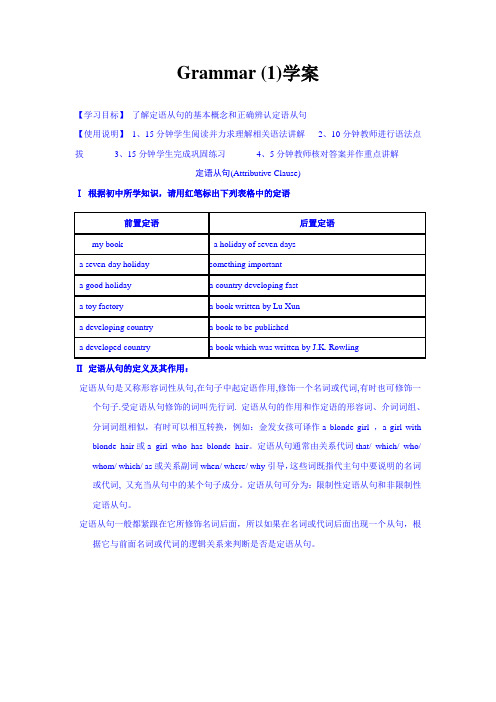
Grammar (1)学案【学习目标】了解定语从句的基本概念和正确辨认定语从句【使用说明】1、15分钟学生阅读并力求理解相关语法讲解2、10分钟教师进行语法点拔3、15分钟学生完成巩固练习4、5分钟教师核对答案并作重点讲解定语从句(Attributive Clause)Ⅰ根据初中所学知识,请用红笔标出下列表格中的定语Ⅱ定语从句的定义及其作用:定语从句是又称形容词性从句,在句子中起定语作用,修饰一个名词或代词,有时也可修饰一个句子.受定语从句修饰的词叫先行词. 定语从句的作用和作定语的形容词、介词词组、分词词组相似,有时可以相互转换,例如:金发女孩可译作a blonde girl ,a girl with blonde hair或a girl who has blonde hair。
定语从句通常由关系代词that/ which/ who/ whom/ which/ as或关系副词when/ where/ why引导,这些词既指代主句中要说明的名词或代词, 又充当从句中的某个句子成分。
定语从句可分为:限制性定语从句和非限制性定语从句。
定语从句一般都紧跟在它所修饰名词后面,所以如果在名词或代词后面出现一个从句,根据它与前面名词或代词的逻辑关系来判断是否是定语从句。
找出下列句中的定语从句;分析定语从句三要素1. You are the right man whom we are looking for.2. I’ve spent all the money that was given by my parents.3. I will never forget the day when I joined the party.4. This is the factory where the machines are made.Ⅳ 关系代词的用法:Ⅴ 课堂练习 12关系词 3关系词在从句中充当成分relative pron. (as sub. ,obj. ,pred.)(that 指人或物 / which 指物 / who(m) 指人/ whose)relative adv. (as adverbial)(when / where / why)Ⅲ 定语从句的必备三要素1 找出下列各句中的定语从句,并分析其先行词:1 The fan that you want is on the desk.2 The woman you saw in the park is our geography teacher.3 Here is the girl whose brother works in this shop.4 That’s the child whose drawing we were looking at just now.5 This is the boy whose sister is a famous singer.2 把下列每对句子合并成含有定语从句的主从复合句1. The man is in the next room. He brought our textbooks here yesterday.2. The magazine is mine. He has taken it away.3. The students will not pass the exam. They don’t study hard.4. The letter is from my sister. I received it yesterday.5. The play was wonderful. We saw it last night.6. The train was late. It was going to Nanning.。
新编英语语法教程PPT课件
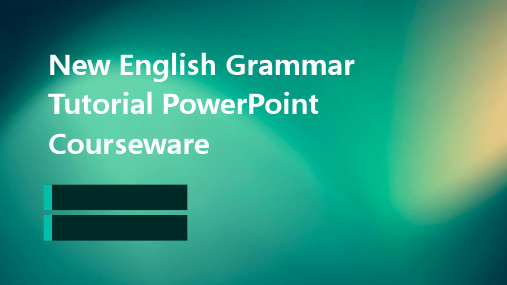
a word or phrase that describes or limits the meaning of another word in a sense
Sense and voice
Sense
indicates when an action or state occurs (past, present, or future)
Introduce clauses that modify nouns or pronouns (e.g., "who," "which," "that")
Used to ask questions about nouns or pronouns (e.g., "who," "what," "which")
Voice
indicates which subject of the presence performs the action (active voice) or receives the action (passive voice)
Subjunctive mood
Subjunctive mood
03 Nouns and Pronouns
Types and Usage of Nouns
Generic names for people, places, or things (e.g., "dog,"
"city")
Co mm on No uns
Refer to ideas, concepts, or qualities
Background
Great+people—grammar++重要知识点讲义 牛津译林版英语九年级下册

【Grammar】重点单词1.passage n.章节,乐段2.by hand 手工【Grammar】重点短语1.be used for doing sth. = be used to do sth. 被用于做某事2.a present taste 现在的状态3.daily routine and habits 日常生活和习惯4.one after another = one by one 一个接一个地/相继地;依次地5.at the moment = right now = now 现在,此刻6.at the same time = in the meantime = meanwhile 同时7.present continuous 现在进行时8.work on 致力于;从事9.leave for+地点动身去某地10.in ancient times 在古代11.search for information 搜索信息12.search for 搜索13.the other day 前几天14.at a certain time 在某时15.the whole night = all the night 整晚16.take part in 参加17.the day before yesterday 前天118.have/has been to sp. 去过某地(已回)19.make a great difference to 产生重大影响20.make a difference 有影响;有关系21.in ancient times/in the old days 在古代22.go bad 变质/变坏23.the invention of... ......的发明24.by hand 手工25.with the invention of…随着……的发明26.in the old days 从前27.make sth. + adj. 使某事/某物......【Grammar】重点句子&语法1.I am working on a history project this week. 这周我正在做一个历史课题。
外研版七年级英语下册单元语法专练-01Module1-Grammar物主代词的用法(专练+答案)

Module 1 Lost and found.Grammar 物主代词的用法(时间:100分钟,满分:100分)一、单项选择(本大题共40小题,每小题1.5分,共60分)1.—Is this ________ card, Tony?— Yes, ________ is.A.you; this B.you; it C.your; this D.your; it 2.—Are those your friends?—No, they are my brothers. _________ names are Charles and Luke.A.They B.Their C.Them D.Theirs 3.—Is that eraser your sister’s?—No, _________ is on the desk. It’s my eraser.A.she B.her C.hers4.—Is this ________ pencil?—Yes, it’s________.A.your; mine B.your; my C.her; mine D.his; hers 5.Jim is Lily’s brother. ______ favourite subject is PE.A.My B.Your C.His D.Her 6.________ am Anna. _________ name is Kate.A.My; She B.My; Her C.I; Her7.This isn’t ________ pen. I left ________ at home this morning.A.me,my B.my,IC.mine,myself D.my,mine8.—Excuse me, Jack. Is this your dictionary?—Yes, it is. It’s ________.A.I B.mine C.me D.my 9.This is not ________ watch. I think it’s ________ watch.A.you, he B.his, her C.she, my D.me, his 10.The hat is Jack’s. The swea ter is ________, too.A.mine B.his C.hers D.yours 11.— Is this your pencil?—No, ________. It’s ________.A.it isn’t;his B.it isn’t;my C.it is;her 12.This is Anna’s brother. ________ favorite subject is math.A.He B.Him C.His D.Her 13.—What’s _________ name?—_________ is Alice.A.her; She B.his; She C.she; Her 14.This is ________ English teacher and he is very fun. What about ________? A.our; you B.us; yours C.our; yours D.us; you 15.For girls, ________ is great. It’s ________ favorite drink.A.bread; his B.milk; their C.bread; their D.milk; his 16.Mom, can I have a new sweater? Look at ________. ________ too short.A.my; It’s B.mine; It C.mine; It’s 17.This computer isn’t ________. It’s Jack’s.A.my B.her C.hers D.their 18.It’s my mother’s birthday. My father will give ________ a new handbag as a birthday present. ________ old one is too old.A.her; Her B.her; She’s C.she; Her D.she; Hers 19.My parents and I love animals a lot, and ________ have a dog and a cat at home.________ names are Emily and Norma.A.they, Their B.we, Our C.they, Them D.we, Their 20.—Hello! What’s ________ name?—Hi! ________ name is Bob.A.my; My B.your; Your C.your; My D.your; I 21.—_________ these your parents?—No, they are _________ uncle and aunt.A.Is;me B.Are;my C.Is;my D.Are;me 22.—What’s your classmate’s name?— _________ name is Lucy.A.Her B.She's C.He's D.His 23.—Are those notebooks Sally’s?—No, they’re ________. I lost them this morning.A.hers B.mine C.ours D.theirs 24.— Is this ________ backpack?— No, ________ is on the sofa.A.yours; mine B.yours; my C.your; mine D.your; my 25.— Is this bag ________, Betty?—No, it’s not mine. It’s Lucy’s.A.yours B.hers C.his D.theirs 26.Mr. Wu is our math teacher, we all love ______.A.he B.he’s C.his D.him 27.—Is this ______ on the sofa?—Yes, it is _______.A.yours; mine B.yours; my C.your; mine D.your; my 28.—Is this English book ________?—No, it’s ________.A.hers, my B.him, mine C.yours, my D.his, mine 29.—Excuse me. Is this Eric’s notebook?—No, ________ is very big. This one is small.A.he B.his C.her D.hers 30.—Excuse me, is this Mary’s pencil box?—Yes, it is. It’s ________.A.mine B.ours C.hers D.theirs 31.________ has an iPhone. ________ color is white.A.Her; It’s B.Her; Its C.She; It’s D.She; Its 32.________ mobile phone is on the table and ________ is over there.A.My; yours B.Your; my C.My; your D.Yours; mine 33.This is ________ iPad. Yours is over there.A.my B.me C.I D.mine 34.The girl is Tina. This is _______ jacket. ________ is yellow.A.her; It B.her; It’s C.her; His D.his; Its 35.— Is this __________ ruler?— No, __________ is in his pencil box.A.Jim; his B.Jim’s; his C.Jim; he D.Jim’s; he36.—Look! Is this your eraser?—No, it’s not ________. It’s Lingling’s.A.mine B.hers C.his D.yours 37.—Are those pencils ________? I found ________ under the desk.—Yes, thank you.A.your;they B.your; them C.yours;them 38.This is my cousin. ________ name’s Tom.A.He B.His C.Her D.My 39.—Could you help ________ with ________ English?—No problem.A.me; mine B.me; my C.I; me D.mine; my 40.— Is this ________ computer?—Yes, it’s ________. My mother bought it for me.A.you; me B.your; my C.yours; mine D.your; mine二、用所给单词的正确形式填空(本大题共20小题,每小题1分,共20分)41.I want to buy Sally a bag for _________ (she) birthday.42.This notebook is not _____________ (my). It’s his.43.Betty and Tony often send emails to _________ (they) old friends.44.—I can’t find my era ser. May I use ____________ (you)?—Of course. Here you are.45.The blue sweater is ________ (I).46.Sue Clark is in ________ (he) class. She’s a nice student.47.The blue hat is _____(my). That white one is Judy’s.48.This is _____ (they) classroom. It’s very tidy.49.Alice and Kitty sees a lot of people on _________ way to school. (they)50.—Is this set of keys yours, Sam?—No, ________ (I) are in my schoolbag.51.Mary lost ________ (she) keys in the classroom.52.I have a yellow sweater and ________ (he) is blue.53.My sister’s favorite sport is volleyball, but ________ (my) is soccer.54.The white model plane is ________ (she).55.My English book is on the desk. How about ________(you) ?56.This is my math book. Where is __________ (your)?57.Mary is a girl. This is ________ (she) favourite dress.58.They nod ________ (they) heads to show “Yes”.59.Tom is a boy and __________(he) family name is Smith.60.Bill often helps Lin Feng because Lin Feng is ________ (he) friend.三、完成句子(本大题共10小题,每小题2分,共20分)61.那个白色的飞机模型是她的。
英语新苏版01:grammar学案(练习及解析)

英语新苏版01:grammar学案(练习及解析)1.Iwasn’tsureifhewasreallyinterestedorifhe______polite.A.wasjustbeingB.willjustbeC.hadjustbeenD.wouldjustbe2.Tom__________inthelibraryeverynightoverthelastthreemonths.A.worksB.workedC.hasbeenworkingD.hadbeenworking3.---Guesswhat,we’vegotourvisasforashort-termvisittotheUKthissummer.----Howmice!you______adifferentculturethen.A.willbeexperiencingB.haveexperiencedC.havebeenexperiencingD.willhaveexperienced4.----BobhasgonetoCalifornia.----Oh,canyoutellmewhenhe_________?A.hasleftB.leftC.isleavingD.wouldleaving5.Joseph______toeveningclassessincelastmonth,buthestillcan’tsay“What’syourname?”inRussian.A.hasbeengoingB.wentC.goesD.hasgone6.----Thatmusthavebeenalongtrip.----Yeah,it__________usawholeweektogetthere.A.takesB.hastakenC.tookD.wastaking7.Aftergettinglostinastorm,amemberofthenavyteam_____fourdayslater.A.rescuedB.wasrescuedC.hasrescuedD.hadbeenrescued8.Didyoupredictthatmanystudents______upforthedancecompetition?A.wouldsignB.signedC.havesignedD.hadsigned9.WhenIgotonthebus,I_____Ihadleftmywalletathome.A.wasrealizingB.realizedC.haverealizedD.wouldrealize10.Shewassurprisedtofindthefridgeempty;thechild_____everything!A.hadbeeneatingB.hadeatenC.haveeatenD.havebeeneating11.Wearrivedatworkinthemorningandfoundthatsomebody______intotheofficeduringthenight.A.brokeB.hadbrokenC.hasbrokenD.wasbreaking12.—Ihearyou______inapub.What’sitlike?—Well,it’sveryhardworkandI’malwaystired,butIdon’tmind.A.areworkingB.willworkC.wereworkingD.willbeworking13.-----Didyouwatchthebasketballmatchyesterday?-----Yes,Idid.Youknow,mybrother________inthematch.A.isplayingB.wasplayingC.hasplayedD.hadplayed14.Thefactthatsomanypeoplestillsmokeinpublicplaces______thatwemayneedanationwidecampaigntoraiseawarenessoftherisksofsmoking.A.suggestB.suggestsC.suggestedD.suggesting15.WhenAlicecameto,shedidnotknowhowlongshe_____there.A.hadbeenlyingB.hasbeenlyingC.waslyingD.haslain16.----Tommyisplanningtobuyacar.----Iknow.Bynextmonth,he______enoughforausedone.A.savesB.savedC.willsaveD.willhavesaved17.----Wereyousurprisedbytheendingofthefilm?----No,I____thebook,soIalreadyknewthestoryA.wasreadingB.hadreadC.amreadingD.h averead18.InthespokenEnglishofsomeareasintheUS,the“r”soundsattheendofthewords______.A.aredroppedB.dropC.arebeingdroppedD.havedr opped19.----I'msorry,butIdon'tquitefollowyou.DidyousayyouwantedtoreturnonSeptember20?----Sorry,I______myselfclear.WewanttoreturnonOctober20.A.hadn'tmadeB.wouldn'tmakeC.don'tmakeD.haven'tm ade20.IttookmealongtimebeforeIwasabletofullyappreciatewhatthey______forme.A.haddoneB.didC.woulddoD.weredoing21.I’mtiredout.I_____allafternoonandIdon’tseemtohavefinishedanything.A.shoppedB.haveshoppedC.hadshoppedD.havebeens hopping22.----Why,Jack,youlooksotired!----Well,I_____thehouseandImustfinishtheworktomorrow.A.waspaintingB.willbepaintingC.havepaintedD.havebeenpaint ing23.I_______allthecookingformyfamily,butrecentlyI’vebeentoobusytodoit.A.willdoB.doC.amdoingD.haddone24.Thepalacecaughtfiresthreetimesinthelastcentury,andlittleoftheoriginalbuildin g______now.A.remainsB.isremainedC.isremaining D .hasbeenremained25.Ifyouplantwatermelonseedsinthespring,you_____freshwatermeloninthefall.A.eatB.wouldeatC.haveeatenD.willbeeating26.Everyfewyears,thecoalworkers______theirlungsX-rayedtoensuretheirhealth.A.arehavingB.haveC.havehadD.hadhad27.—HaveyouknownDr.Jacksonforalongtime?—Yes,sinceshe______theChineseSociety.A.hasjoinedB.joinsC.hadjoinedD.joined28.Selectingamobilephoneforpersonaluseisnoeasytaskbecausetechnology______sorapidly.A.ischangingB.haschangedC.willhavechangedD.willchange29.IliketheseEnglishsongsandthey________manytimesontheradio.A.taughtB.havetaughtC.aretaughtD.havebeentaught30.Sofarthisyearwe______afallinhousepricesbybetween5and10percent.A.sawB.seeC.hadseenD.haveseen31.I______ping-pongquitewell,buthaven’thadtimetoplaysincethenewyear.A.willplayB.haveplayedC.playedD.play32.—Doyouhaveanyproblemsifyou______thisjob?—Well,I’mthinkingaboutthesalary….A.offerB.willofferC.areofferedD.willbeoffered33.---Rememberthefirsttimewemet,Susan?---OfcourseIdo.You_______inthelibrary.A.readB.hadreadC.werereadingD.wouldread34.—Didyouseeamaninblackpassbyjustnow?—No,sir.I________anewspaper.〔四川卷〕A.readB.wasreadingC.wouldreadD.amreading35.----Doyouthinkweshouldacceptthatoffer?----Yes,weshould,forwe___suchbadluckuptillnow,andtime__out.A.havehad;isrunningB.had;isrunningC.have;hasbeenrunD.havehad;hasbeenrun36.—Haveyouhandedinyourschoolworkyet?—Yes,Ihave.Iguessit______now.A.hasgradedB.isgradedC.isbeinggradedD.isgrading37.—Isthereanythingwrong,Bob?Youlooksad.—Oh,nothingmuch.Infact,I____ofmyfriendsbackhome.A.havejustthoughtB.wasjustthinkingC.wouldjustthinkD.willjustbethinking38.—HowcanIapplyforanonlinecourse?—Justfilloutthisformandwe_____whatwecandoforyou.A.seeB.areseeingC.haveseenD.willsee39.Theflowersweresolovelythatthey__________innotime.A.soldB.hadbeensoldC.weresoldD.wouldsell40.----Didyougototheshowlastnight?----Yeah.Everypersoninthearea_________invitedA.wereB.havebeenC.hasbeenD.was41.Thosewhowerelateforschoolthismorning,downyournamesontheblackboard!A.writeB.wroteC.arewritingD.willwrite42.I’mverydisappointedwithmyneighbor.Shesaidshewouldkeephercatoffmygrass,butshe_ ____.A.didn’tB.hasn’tC.wouldn’tD.hadn’t43.Idon’tbelieveyou’vealreadyfinishedreadingthebook—I______ittoyouthismorning!A.wouldlendB.waslendingC.hadlentD.lent44.----What’sthatnoise?----Oh,Iforgottotellyou.Thenewmachine______.A.wastestedB.willbetestedC.isbeingtestedD.hasbeentested45.Teenagers__theirhealthbecausetheyplaycomputergamestoomuch.A.havedamagedB.aredamagingC.damagedD.willdamage46.Themanager___theworkershowtoimprovetheprogramsince9a.m.A.hastoldB.istellingC.hasbeentellingD.willhavetold47.Inordertofindthemissingchild,villagersalltheycanoverthepastfivehours.A.didB.doC.haddoneD.havebeendoing48.Afterschoolwewenttothereading-roomtodosomereading,onlytobetoldthatit.A.wasdecoratedB.haddecoratedC.hadbeendecoratingD.wasbeingdecorated49.Foodsuppliesintheflood-strickenarea_____.Wemustactimmediatelybeforethere’snoneleft.A.haverunoutB.arerunningoutC.havebeenrunoutD.arebeingrunout50、----Whendidthecomputercrash?----Thismorning,whileI______thereadingmaterialsdownloadedfromsomewebsites.A.havesortedB.wassortingC.amsortingD.hadsorted51.----CanIcallyoubackattwoo’clockthisafternoon?----I’msorry,butbythenI_____toBeijing.Howaboutfive?A.flyB.willflyC.willbeflyingD.amflying52.“Themoment_____soon,”hethoughttohimself,waitingnervously.A.cameB.hascomeC.wascomingD.iscoming53.Ifeelsoexcited!AtthistimetomorrowmorningI_____toShanghai.A.willbeflyingB.willflyC.havebeenflyingD.haveflown54.—DidyoucatchwhatIsaid?—Sorry.I______atextmessagejustnow.A.hadansweringB.haveansweredC.wouldanswerD.wasanswering55.Theyarelivingwiththeirparentsforthemomentbecausetheirownhouse____.A.isbeingrebuiltB.hasbeenrebuiltC.isrebuiltD.hasrebuiltKeys:1-5ACABA6-10CBABB11-15BABBA16-20DBADA21-25DDBAD26-30B DADD31-35DCCBA36-40CBDCD41-45AADCB46-50CDDBB51-55CDAD A。
Advanced English Grammar.doc 01

目录第一章名词1.1 概述1.1.1名词的分类1.1.2复合名词1.1.3名词化现象1.2 名词的数1.2.1 经常用作单数的名词1.2.2 经常用作复数的名词1.2.3 某些集合名词的数的特殊用法1.2.4 单复数同形的名词1.2.5复合名词的数1.2.6 不规则名词数的变化1.2.7 不可数名词数量概念的复杂变化1.2.8 定语名词的数1.2.9 各国人的单数、复数对照表1.3 名词的格1.3.1 -’s所有格的规则1.3.2 -’s所有格的用法1.3.3 of属格的用法1.3.4 名词的双重所有格1.4 名词的性1.4.1表人的名词的性1.4.2 表人的名词的双重性1.4.3集体名词的性1.4.4动物名词的性1.4.5 小动物、植物和非生物名词的性1.5 名词的句法功能1.6 常见的名词后缀1.6.1英语中常见的名词后缀的种类1.6.2意义较强的名词后缀第二章冠词2.1 概述2.2 不定冠词2.3 定冠词2.4 零冠词2.5 冠词与形容词+名词结构2.6 冠词的位置的复杂变化2.6.1 不定冠词位置的复杂变化2.6.2. 定冠词位置的复杂变化第三章代词3.1 概述3.2 人称代词3.2.1英语中的人称代词3.2.2人称代词的用法3.3 物主代词3.3.1英语中的物主代词3.3.2形容词性物主代词3.3.3名词性物主代词3.4 反身代词3.4.1 英语中的反身代词3.4.2反身代词在句中的作用3.5 指示代词3.6 疑问代词3.6.1英语中的疑问代词3.6.2 疑问代词who, whom的用法3.6.3 whose, what, which 在句子中的作用3.7 关系代词3.7.1引导定语从句的关系代词3.7.2 which 的用法3.7.3 that的用法3.7.4关系代词的省略3.8 连接代词3.8.1连接代词的作用3.8.2 what 的特殊意义3.8.3 whomever, whatever, whichever的用法3.9 不定代词3.9.1 不定代词both, either和neither的用法3.9.2 不定代词all的用法3.9.3 不定代词every3.9.4不定代词each3.9.5不定代词one3.9.6不定代词none3.9.7 由no构成的合成代词3.9.8不定代词some和any3.9.9 不定代词many, much, few和little3.9.10 不定代词other和another3.9.11 相互代词each other 和one another3.9.12不定代词whatever, whoever和whomever 第四章数词4.1 概述4.2 基数词4.3 序数词4.3.1 英语序数词的构成4.3.2序数词在句子中的作用4.4 倍数、分数、小数与百分数的表示法4.4.1倍数4.4.2分数4.4.3小数4.5 数学算式表示法4.5.1加、减、乘、除算式4.5.2比例与乘方、开方4.5.3面积表示法4.6 编号4.6.1 各类典型编号表示法见下表4.6.2 时间表示法4.7 币制表示法4.7.1英国币制表示法4.7.2美国币制表示法第五章动词5.1 概述5.2 实意动词5.3 联系动词5.4 助动词5.5 动词的基本形式5.6 常见的动词词缀的意义第六章动词的时态6.1 概述6.2 动词的时态6.3 时态的呼应6.3.1主句是过去时6.3.2主句是现在时或将来时6.4 现在完成时与现在完成进行时的比较分析第七章动词的被动语态7.1 概述7.2 各种时态的被动语态7.3 一些常见的被动语态的句型第八章动词—助动词和情态动词8.1 概述.8.2 助动词8.3 情态动词第九章动词不定式9.1 概述9.2 不定式的种类和结构9.3 不定式的动词性特征9.4 动词不定式的作用9.5 疑问词后加不定式的用法9.6 作为独立结构的不定式9.7 情态动词后的不定式用法第十章动名词10.1概述10.2动名词的形式10.2.1动名词按照时间意义的分类形式10.2.2动名词按照语态概念的分类形式10.2.3动名词的复合结构10.2.3.1名词属格+ 动名词10.2.3.2形容词性物主代词+ 动名词10.2.3.3代词宾格+ 动名词10.2.3.4名词通格+ 动名词10.3动名词的否定结构10.3.1 not + 动名词10.3.2 no + 动名词10.4动名词的双重性特征10.4.1动名词的动词性特征10.4.2 动名词的名词性特征10.4.3 动名词名词化的显性特征10.4.4名词化动名词与其同源名词的区别10.5动名词与不定式比较分析10.6“介词+ 动名词”与不定式结构比较分析第十一章分词11.1 概述11.2 现在分词11.2.1现在分词的结构种类11.2.2现在分词的功能11.2.3现在分词与不定式的比较分析11.2.4构成进行时态的现在分词与动名词作表语比较分析11.2.5现在分词与动名词作定语的比较分析11.2.6现在分词与介词的关系分析11.3 过去分词11.3.1 过去分词的构成形式11.3.2过去分词的意义11.3.2.1表示被动含义11.3.2.2表示完成含义11.3.2.3既表示被动含义又表示完成含义11.3.3过去分词的读音11.3.4过去分词的双重性11.3.4.1动词性特征11.3.4.2形容词性特征11.3.4.3副词性特征11.3.5过去分词的功能11.3.5.1作表语11.3.5.2 作定语11.3.5.3作状语11.3.6过去分词独立结构11.3.7过去分词与现在分词比较分析11.3.7.1意义的区分11.3.7.2易混淆用法11.3.8 名词化的过去分词第十二章虚拟语气12.1 语气的含义12.1.1直陈语气.12.1.2 祈使语气.12.1.3 虚拟语气.12.2 虚拟语气在条件状语从句中的应用12.2.1 虚拟语气用与现在事实相反的条件句中12.2.2 虚拟语气用于过去事实相反的条件句中12.2.3 虚拟语气用于将来事实相反的条件句中12.2.4 混合时态的虚拟语气12.2.5 省略连词if的条件从句12.2.6 含蓄型虚拟语气12.2.7 省略主句的非真实条件句12.3 虚拟语气在其它从句中的应用.12.3.1“wish型”用于宾语从句12.3.2“坚决要命的意愿型”用于宾语从句、表语从句、同位语从句及主语从句12.3.3 as if (as though) 引导的方式状语从句12.3.4 even if (even though) 引导的让步状语从句12.3.5 lest, in case,for fear that引导的目的状语从句12.3.6“It is time (that) 型”用于定语从句.12.3.7 “would rather型”12.4 虚拟语气在感叹句,祝愿句中的应用第十三章形容词.13.1 形容词的定义及分类13.2 形容词的特征13.3 形容词的功能13.3.1 中心形容词13.3.2 外围形容词.13.4 形容词在句中的顺序13.5 形容词的名词化13.5.1 泛指一类人13.5.2 指抽象事物13.6 形容词的级13.6.1 级的规则变化.13.6.2 级的不规则变化13.6.3 级的意义.第十四章副词14.1 副词的定义及分类14.1.1从构词方面分类14.1.2从词义方面分类14.2 副词的功能14.2.1作状语14.2.2作表语14.2.3作定语.14.2.4作宾语补语14.2.5作介词宾语14.3 副词的位置14.4 副词的位置顺序14.5 副词的级14.6 几组形意相似的副词第十五章介词15.1 概述15.2 常见介词的用法15.3 介词与名词、形容词、动词的搭配关系15.4 介词词组15.5 介词词组与某些限定从句的转换关系15.6 介词和介词短语的搭配第十六章连词16.1 连词的定义和种类16.2 并列连词16.3 从属连词第十七章感叹词17.1 概述17.2 常用感叹词17.3 其他种类的词表达感叹的情况17.4 其他.第十八章句子及句子成分18.1 句子的分类18.2 基本句型(Basic Sentence Patterns).18.3 句子成分的定义和分类第十九章名词性从句19.1 概述19.2 主语从句19.3 宾语从句19.4 直接引语和间接引语19.5 表语从句19.6 同位语从句第二十章定语从句20.1 概述20.2 关系代词引导的定语从句20.3 关系副词引导的定语从句20.4 限定性定语从句与非限定性定语从句20.5 As在定语从句中的用法20.6 判断关系代词与关系副词20.7 定语从句与强调句的区别20.8 定语从句与同位语从句的区别20.9 定语从句总结第二十一章一致关系21.1 概述21.2 主谓一致21.3 其他一致关系第二十二章倒装22.1 概述22.2 倒装的种类22.3 部分倒装22.4 完全倒装22.5 其他情况的倒装22.6 前置第二十三章省略和替代23.1 省略23.1.1 概述23.1.2 省略结构的种类和作用23.1.3 复合句中的省略现象23.1.4特殊省略结构23.2 替代23.2.1 概述23.2.2 替代的种类23.2.3 动词性替代23.2.4 分句性替代。
Concise English Grammar Unit 01
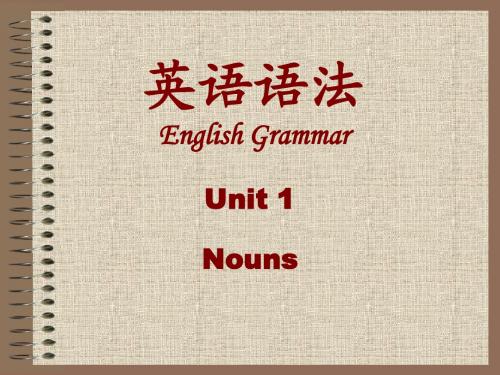
英语语法English GrammarUnit 1NounsStudy objectivesWarm-up activity Course IntroductionUnit 1 NounsHomeworkStudy objectivesBy the end of this lesson, you should be able to:know how to study this courseclassify the classes of nounsgrasp the usages of nouns: countable/uncountable/apostrophe formPart OneIntroduction of the CourseStudy Objectives of this CourseBy the end of this course, you should be able to know more about the features of English, and use English freely in all kinds of communications.Textbook of the Course•高等教育出版社出版的、由王振芳主编的《新编实用英语语法》。
Study Contents名词、代词、数词、限定词、介词、形容词与副词、时态、被动语态、非谓语动词、虚拟语气、名词从句、定语从句、状语从句、It的用法、倒装等。
Study Materials •文字教材•网络课程•CAI光盘•IP课件How to study this course?•Make a proper study plan carefully •Take part in all the activities in the classroom and out of the classroom •Make good use of the on-line resources and other study materials to help your studyPart TwoUnit 1 NounsWarm-up ActivityAbout Nouns•表示人、物、地点以及抽象概念名称的词叫名词(noun)。
Unit2 Using language(Grammar)课件-高一英语上学期外研版必修第一册

3.表示时间
pre- “前” war → pre-war(战前的) post-“后” war → post-war(战后的)
4.表示其他意义 re- “又,再” arrange→ rearrange (重新安排) en- “使......” able→ enable (使能够)
02 Studying the rules
(4)形容词 名词 You are right.
(意义改变)
Citizens have the right to speak freely.
02 Studying the rules
【即学即练】
请大家判断词性转化类型,然后翻译句子
(1) Let me have a try.
让我来试一试。v.-n.
mis- understand → misunderstand(误解) non- profit → non-profit(非营利的) un- certain →uncertain(不确定的)
02 Studying the rules
Prefix-前缀
by- “附近,邻近”road → byroad(侧道)
外研版(2019 )英语 必修一
Unit 2
01 Discovering the rules 02 Studying the rules 03 Applying the rules
01 Discovering the rules
pine
apple
pineapple
basket
ball
basketball
(2) You could shoulder the task. 你可以承担这项任务。 n.-v.
(3) You should try your best to better your performance.
Unit8grammar知识点讲义牛津译林版英语七年级上册

【Grammar】重点单词1. lie vi.躺,平放→(现在分词) lying 【Grammar】重点短语1. write to 写信给2.be a member of .... 成为……的一员3.talk to sb. 跟某人谈话4. wait for 等候5.dancing lessons/classes 舞蹈课6.. look for 寻找7.play a new puter game 玩新的电脑游戏8. play with sb. 和某人玩耍9. lie on the bed 躺在床上【Grammar】重点句子&语法1. Look! Simon is playing football with his friends in the playground. 看!西蒙正在操场上和他的朋友们踢足球。
2. Millie is writing a letter to her friend about the fashion show. 米莉正在给她的朋友写一封关于时装表演的信。
3. I am eating. 我在吃东西。
4. You/ We/ They are eating. 你(们)/我们/他们在吃东西。
5. He/ She/ It is eating. 他/她/它在吃东西6. I am not eating. 我没在吃东西。
7. You/ We/ They are not eating. 你(们)/我们/他们没在吃东西。
8. He/ She/ It is not eating. 他/她/它没在吃东西。
9.—Am I eating? 我在吃东西吗? —Yes, I am. / No, I am not / 'm not. 是的,我在吃东西。
/不是,我没在吃东西。
10.—Are you / we / they eating? 你(们)/我们/他们在吃东西吗?—Yes, you / we / they are. / No, you /we / they are not / aren’t.是的,你(们)/我们/他们在吃:2.0东西。
Unit 3 课时3 Grammar(教师版)九年级英语全一册同步精品讲义(人教版)
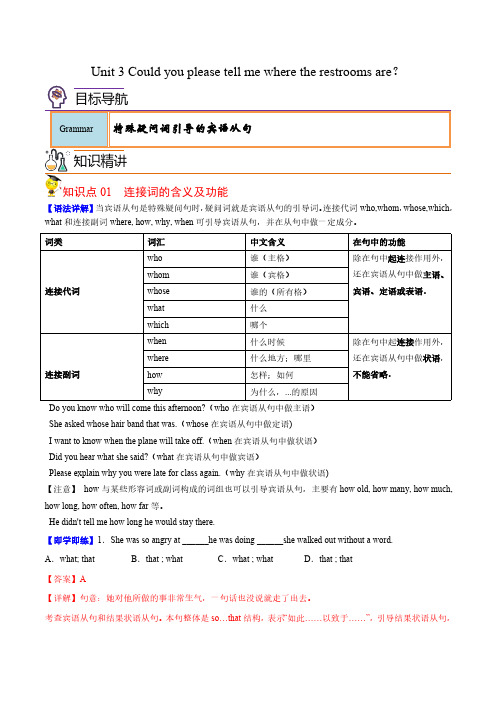
Unit 3 Could you please tell me where the restrooms are?知识点01 连接词的含义及功能【语法详解】当宾语从句是特殊疑问句时,疑问词就是宾语从句的引导词。
连接代词who,whom,whose,which,what和连接副词where, how, why, when可引导宾语从句,并在从句中做一定成分。
词类词汇中文含义在句中的功能who谁(主格)whom谁(宾格)whose谁的(所有格)what什么连接代词which哪个除在句中起连接作用外,还在宾语从句中做主语、宾语、定语或表语。
when什么时候where什么地方;哪里how怎样;如何连接副词why为什么,...的原因除在句中起连接作用外,还在宾语从句中做状语,不能省略。
Do you know who will come this afternoon?(who在宾语从句中做主语)She asked whose hair band that was.(whose在宾语从句中做定语)I want to know when the plane will take off.(when在宾语从句中做状语)Did you hear what she said?(what在宾语从句中做宾语)Please explain why you were late for class again.(why在宾语从句中做状语)【注意】how与某些形容词或副词构成的词组也可以引导宾语从句,主要有how old, how many, how much, how long, how often, how far等。
He didn't tell me how long he would stay there.【即学即练】1.She was so angry at ______he was doing ______she walked out without a word.A.what; that B.that ; what C.what ; what D.that ; that【答案】A【详解】句意:她对他所做的事非常生气,一句话也没说就走了出去。
Grammar 1

Teaching Plan for8B Unit 1 Grammar ITitle Past and present Grade8 Teachin material8B Unit 1Grammar I from Oxford EnglishTeaching aims By the end of the lesson, students should be able toa.Know when to use the present perfect tense.b.Know the structure of the present perfect tense.Important anddifficult teachingpointsUse the meaning of the present perfect tense.Teaching proceduresStep One: PresentationIntroduce some sentencesa. I ate my breakfast at 6:30 this morning. ------I have already had my breakfast. (I am full now.)You finished your holiday exercises in the winter holiday.------You have already finished them.我们用现在完成时(Present perfect tense)来谈论:1.过去发生仍与现在有某些联系或有影响的动作或情况。
b.You learne d English 5 years ago.You have learned Englis h since 5 years ago\ you were in primary school.(过去的时间点)You have learned English for 5 years.(时间段)我们用现在完成时(Present perfect tense)来谈论:2. 过去发生延续到现在的动作或情况。
大学英语第一课详解
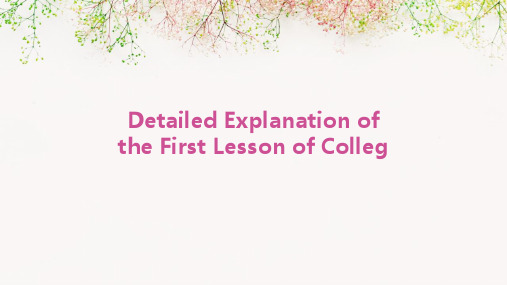
Writing skills
Listening and speaking
Practice listening comprehension and fluent speaking in different contexts
Course content
Theory and practice
Integrate theory and practical exercises to enhance learning outcomes
Pronunciation correction
03
02
01
04
English writing exercises
Paragraph development
The ability to organize ideas into coherent paragraphs is critical for effective writing Paragraphs should have a clear topic presence, supporting presence, and a conclusion presence that ties everything together
Vocabulary usage
A rich vocabulary can enhance written expression It is important to choose precise words that consider meaning effectively
牛津译林版英语八年级寒假复习预习讲义01

第一讲Grammar 形容词和副词Part 1形容词的比较级和最高级形容词有三种等级:原级、比较级、最高级。
原级:句中只有一者时用原级,其标志词是very, so, too, quite等。
⏹His handwriting is very good.他的书法很好。
(一个人不作比较。
)★形容词比较级和最高级的构成:一般在原级后加er 构成比较级,加est构成最高级。
①规则变化②. 不规则变化①.⏹My bike is more beautiful than hers.我的自行车比她的漂亮。
⏹He works harder than before. 他工作比以前努力。
②.表示“两者之间较……之一”⏹Which is nearer to the sun, the moon or the earth? 哪个离太阳更近,月球还是地球?⏹He is the thinner of the two. 他是两人中较瘦的那个。
③“more and more 原级”。
⏹The weather is being colder and colder. 天气变得越来越冷了。
⏹She is being more and more beautiful. 她变得越来越美了。
④. 表示“越……越……”时,用“the+比较级,the+比较级”结构。
⏹The more careful you are, the more points you will get. 你越细心,得分越多。
①. 表示三者及以上人或物进行比较时用最高级,结构为⏹The picture is the best of all. 这幅画是所有画中最好的。
⏹She is the most beautiful girl in the class. 她是班上最美的女孩。
②. 表示在三者及以上之间选择,用⏹Who is the tallest, Tom, Kate or Bill? 汤姆、凯特、比尔,谁最高?③. 表示“最……之一”用⏹She is one of the most popular teachers in our school. 她是我们学校最受欢迎的老师之一。
- 1、下载文档前请自行甄别文档内容的完整性,平台不提供额外的编辑、内容补充、找答案等附加服务。
- 2、"仅部分预览"的文档,不可在线预览部分如存在完整性等问题,可反馈申请退款(可完整预览的文档不适用该条件!)。
- 3、如文档侵犯您的权益,请联系客服反馈,我们会尽快为您处理(人工客服工作时间:9:00-18:30)。
1. An underlying assumption of most market research is that people are continually ____ financial decisions based on their desire for goods that give them the most satisfaction.
(A) making
(B) and make
(C) being made
(D) having made
2. ____ tempera paint, the artist mixes dry pigments with water until the mixture resembles a stiff paste.
(A) In preparation
(B) The preparing of
(C) To prepare
(D) Prepared
3. When two straight lines meet, ____ an angle.
(A) it is formed
(B) formed
(C) they form
(D) to form
4. Madge Macklin promoted the expansion of medical training include genetics __ supported the founding of genetics departments in North American medical schools.
(A) nor
(B) and
(C) while
(D) if
5. mammals have hair at some time in their lives, though in certain whales it is present only before birth.
(A) Most
(B) The most
(C) Most of which
(D) In most of the
6. The digestive enzyme pepsin breaks down proteins into components ____ readily absorbed by the human body.
(A) that can be
(B) and are
(C) which they
(D) are to be
7. ____ the precise qualities of the hero in literary works may vary over time, the basic exemplary function of the hero seems to remain constant.
(A) Whatever
(B) Even though
(C) In spite of
(D) Regardless
8. Not until the dedication of Yellowstone Park in the late nineteenth century ____ a national park.
(A) the United States had
(B) did the United States have
(C) when the United States had
(D) the United States having
9. Daniel Ken Inouye, Hawaiis first Congressman, was elected to the United States Senate in 1963, where ____ known for his unbiased views on civil issues.
(A) being
(B) it is he
(C) he became
(D) having become
10. Because caricature tends to emphasize the peculiarities of a subject, ____ an effective vehicle for pictorial satire.
(A) which is often
(B) and often seen as
(C) it is often
(D) many of which are
11. In the nineteenth century, Samuel Gridley Howe founded the Perkins School for the Blinds, ____ for children in Boston, Massachusetts.
(A) that institutes
(B) while instituted
(C) was an institution
(D) an institute
12. Early forms of life on Earth, ____ in the absence of oxygen, required elements such as sulfur instead.
(A) which lived
(B) whose life
(C) lived
(D) were living
13. People in prehistoric times created paints by grinding materials such as plants and clay into powder ____ .
(A) water to be added
(B) for adding water then
(C) and water added
(D) and then adding water
14. Often very annoying weeds, ____ and act as hosts to many insect pests.
(A) that crowd out less hardy plants than goldenrods
(B) crowding out less hardy plants by goldenrods
(C) the goldenrods crowding out of less hardy plants
(D) goldenrods crowd out less hardy plants
15. Starting around 7000 B.C., and for the next four thousand years, much of the Northern Hemisphere ____ temperatures warmer than at present.
(A) with experience of
(B) experienced
(C) experiencing
(D) experience
16. (Among) the (favorite) attractions (at the National) Air and Space Museum in Washington D.C. are the (film) presented on the five-story-tall screen.
Keys:
1-5: ACCBA 6-10: ABBCC 11-15: DADDB 16: D。
